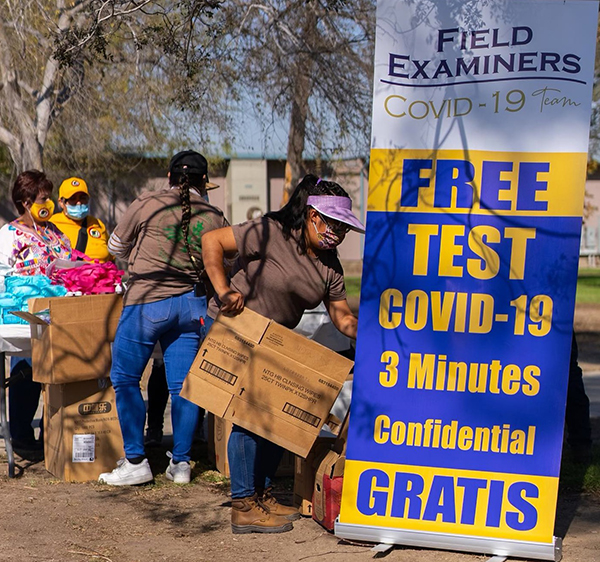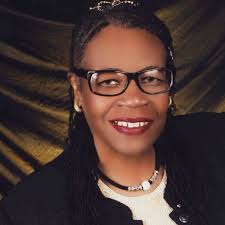By Darlene Donloe
Contributing Writer
Mily Treviño-Sauceda is the executive director and co-founder of Alianza Nacional de Campesinas, the first national women farmworkers’ organization in the U. S. created by current and former women farmworkers, as well as women from farmworker families.
The organization’s mission is to unify the struggle to promote women farmworkers’ leadership in a national movement to create broader visibility and advocate for changes that ensure their human rights.
An organization by and for campesinas (country woman farmers) organizing their communities for labor standards that center on worker health and safety, for immigrant and migrant justice, and for an end to gender-based violence, Alianza Nacional de Campesinas works to incorporate gender, migrant, labor and climate justice.
The organization works for sustainable and healthy communities where women farmworkers and their families can live well and thrive.
Trevino-Sauceda knows the situation all too well. She used to be one of those women farmworkers. From the age of 8 to 12, she worked on farms with her family.
“It was seasonal work,” she said. “It’s a very hard job.”
She witnessed firsthand the atrocities suffered by farmworkers in general, but especially female farmworkers who range in age from the late 20s to early 30s and are subject to sexual harassment and worse. Trevino-Sauceda said there also are a lot of teens working the fields who don’t attend school.
“The majority of harassment and discrimination comes from the crew leaders, owners and supervisors,” Trevino-Sauceda said. “There is entitlement thinking in rural communities and urban communities. In Mexico, there is still the thinking of men having the … privilege. It keeps women serving men all the time.”
Trevino-Sauceda worked in the fields in Idaho with two of her siblings.
“My family worked on irrigation pipes,” she said. “I remember we had to get up at 4:30 in the morning. We worked early morning from February through October, then the snow would come. I remember being bullied by boys.
“I was harassed. I was assaulted, not raped because I was lucky. If it would have happened, the myths say, I would be blamed. It was rough.”
At the time, Trevino-Sauceda said her family was getting paid “by the piece.”
“We were harvesting lemons, oranges and grapefruits,” she said. “The heavy sacks would weight up to 70 pounds. We organized other families working in citrus.”
In 1988, before she helped found Alianza Nacional, Trevino-Sauceda worked with her sister-in-law to help organize women farmworkers.
“I learned how to organize through the United Farm Workers,” said Trevino-Sauceda, who earned a bachelor’s degree in Chicano Studies with enough credits for a minor in women studies at Cal State Fullerton and received her master’s in social sciences from Antioch University.
“We wanted to do a survey with female farmworkers,” she said. “We thought it was very important. There were health issues and other issues happening. We interviewed 60 women in Coachella. That’s when I said we had to organize farmworker women. Women were interested in forming something.”
In 1989, Trevino-Sauceda said there was a commitment to organize a network of women farmworkers in the U.S., and that they “needed to do it first in California.”
“By 1992, we had formed a statewide organization of women,” she said. “I helped put that together. We formed 12 chapters around the state. In 1997, we incorporated and I became the first executive director. The 12 chapters are represented in Lideres Campesinas.”
Trevino-Sauceda’s commitment to the farmworker’s women’s movement is well documented.
Known as one of the founders of the women’s farmworker movement in the U.S., since the late 1980s, she has assisted Líderes Campesinas as a member recruitment and orientation coordinator. She co-founded “Mujeres Mexicanas” in Coachella Valley and with support from the California Rural League Assistance Foundation, she co-founded Líderes Campesinas in 1992, the first state-based women’s farmworker grassroots organization. Treviño-Sauceda served as the executive director of Líderes Campesinas for more than 12 years and became president emeritus of the organization.
For more than 30 years, Lideres Campesinas has organized farmworker women.
In 2012, Lideres Campesinas advocated for and got a statewide Farm Worker Women’s Sexual Assault and Domestic Violence Program.
Trevino-Sauceda, 63, said it’s important to form organizations that lift up women’s voices.
“An organization like Alianza Nacional is important because it was going to help us have more options and make changes — and make sure our children have what we didn’t have,” she said. “We have to deal with women not being hired. They only hire men. It was important to advocate for better representation. It’s important for us to do it for ourselves.”
The organization’s goal is to secure help and resources for women farmworkers on many issues, including domestic violence, sexual harassment, basic employment rights, health care, education, housing, immigration and other issues.
According to Alianza Nacional, in one study it was found that 80% of women farmworkers said they experienced some form of sexual violence on the job. Another study found that about one-third of women farmworkers suffer domestic violence.
“We had to deal with violence against women,” said Trevino-Sauceda, who married at 21 and became a widow at 27. “We come from traditional families. The traditional ways keep women from being who they want to be. We need to end it. Our purpose is to empower women farmworkers. You don’t think of possibilities, you just want to survive.”
Alianza Nacional de Campesinas members have conceptualized and created educational materials on the issue of sexual harassment and domestic violence.
They also have developed outreach strategies and have helped other advocates develop resources, safety plans and other information for farmworker victims and survivors.
Alianza Nacional de Campesinas members use and promote effective approaches to raise these sensitive and difficult topics, including using theater, house meetings and art.
At least 50% of the nearly 3 million farmworkers in the United States are undocumented. Many more are under provisional statuses through Deferred Action for Childhood Arrivals (DACA), Temporary Protected Status (TPS), and other forms of temporary relief from deportation and work authorization that at the same time do not offer full civil rights. Alianza is calling for citizenship for everyone.
Currently, Alianza Nacional is comprised of 15 member organizations and groups based across 10 states and Washington, D.C.
“I learned how to organize through the UFW (United Farm Workers),” she said. “At the time, we learned about our rights and pushed for union contracts.”
“Farmworkers don’t get overtime and are always getting minimum wage,” said Trevino-Sauceda, who was born in Bellingham, Washington, but now lives in Coachella. For everything Alianza Nacional de Campesinas does, Trevino-Sauceda said the most pressing issue is “advocacy.”
When it comes to the plight of farmworkers, Trevino-Sauceda said there is a lot the general public doesn’t know.
“One is that when you go to the supermarket, you don’t know where anything is coming from,” she said. “You don’t know the situation and working conditions of farmworkers. People just know it’s a beautiful apple, orange and lettuce.
“They don’t know that the worker had heat stress, not enough breaks, no shade to rest, or that wages are being stolen. They don’t know there is no sanitation or that restrooms are only clean on Monday. They don’t know there are no rights, no health insurance.
“They don’t know that women are being assaulted or raped. They don’t know that nine out of 10 women have been sexually harassed. We want to make everyone aware of what women farmworkers are living with. Maybe next time, they’ll think about that.”
A tireless advocate, Trevino-Sauceda is in the struggle for the long haul.
“We hire farmworker women,” she said. “Some didn’t even go to school and they are still workers for this movement. They are getting paid to do what they love to do — which is to advocate.
“Now they see they have options. Seeing the women advocate for them and for others makes me proud. You can see the pride in how women do it. We become visible. When you’re visible, you’re heard.”
“Making a Difference” is a weekly feature profiling organizations that are serving their communities. To propose a “Making a Difference” profile, send an email to newsroom@wavepublication.com.
Darlene Donloe is a freelance reporter for Wave Newspapers who covers South Los Angeles. She can be reached at ddonloe@gmail.com.












